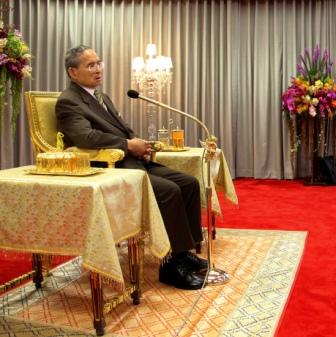The King
More on:

In the Sunday New York Times, Seth Mydans and Thomas Fuller, the Bangkok correspondents, have written an insightful article on Thailand’s King Bhumibhol Adulyadej and why he has not intervened in the ongoing chaos in Bangkok. After all, during previous rounds of bloodshed, such as in 1973 and 1992, the king did step in, trying to mediate between warring factions and help preserve some kind of peace. Fuller and Mydans correctly note that one of the main reasons why the king has not intervened this time around is that, unlike during past demonstrations, this time one side (the red shirts) might not listen to him, since some of the red shirts do not buy into the myth and moral force of the Thai monarchy. That’s not surprising, given that the monarchy historically has used its power to benefit a certain segment of Bangkok elites, while arguing that the rest of the country should exist in a “sufficiency economy” (i.e. that the little people should know their place and stick to basic farming while the upper classes run the rest of the economy).
However, what Mydans and Fuller fail to note is that it is not as if the king’s enormous popularity, bordering on Kim Jong Il cult status, just collapsed this month. For years, the rural poor, and the working class in Bangkok, have begun to recognize that the king does not necessarily act in their interests. For at least five years, and probably more, I have heard veiled criticism of the palace from taxi drivers, farmers, and other working class Thais, usually expressed in vague ways or targeted at the crown prince or even the queen, who is even more pro-elite and pro-army than the king. As Paul Handley shows in his groundbreaking 2006 book on Bhumibhol, The King Never Smiles, educated Thai liberals who desire a real democracy have long realized that the king, though in some ways a positive influence, has also often used that influence anti-democratically. Many of these same liberal intellectuals served as sources for Handley, or helped point him to important evidence. It was only the strict Lèse majesté laws in Thailand, which make any criticism of the palace a crime, that prevented such an outpouring before, but those laws increasingly seem to be failing, as anger builds and the Internet and other media allow greater discussion of the monarchy.
More on:
 Online Store
Online Store
